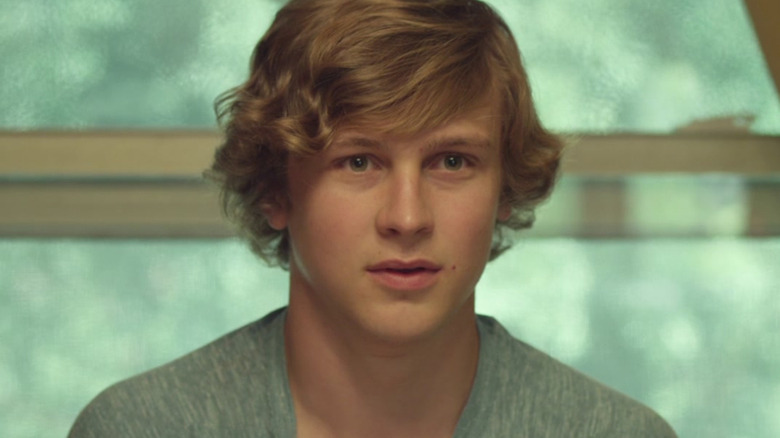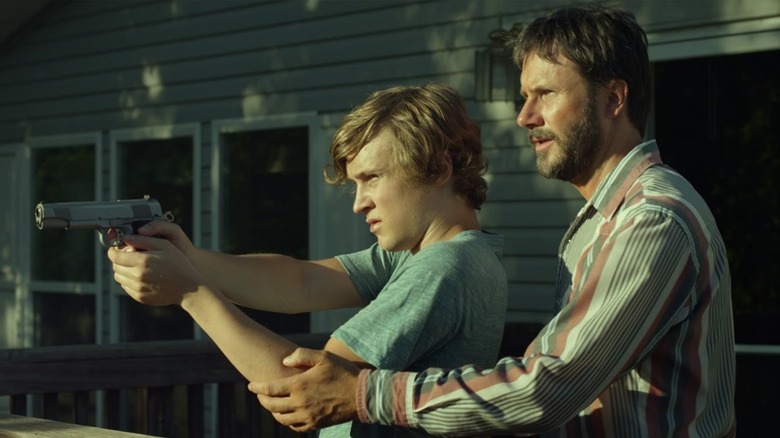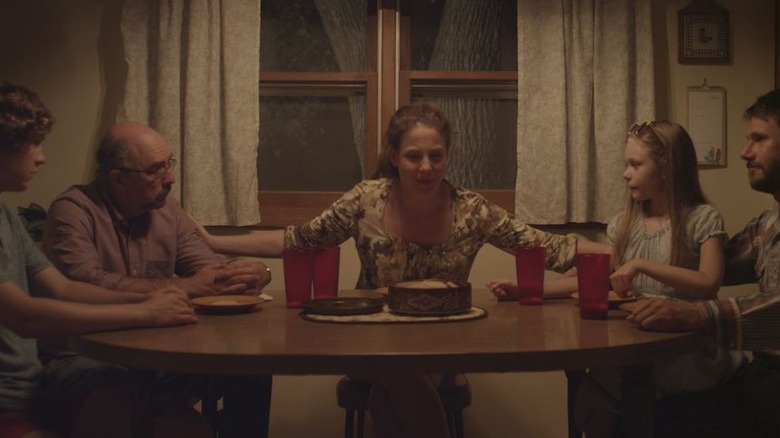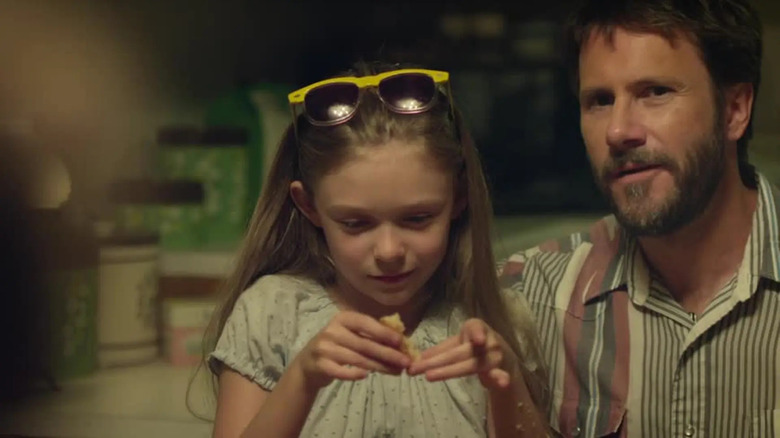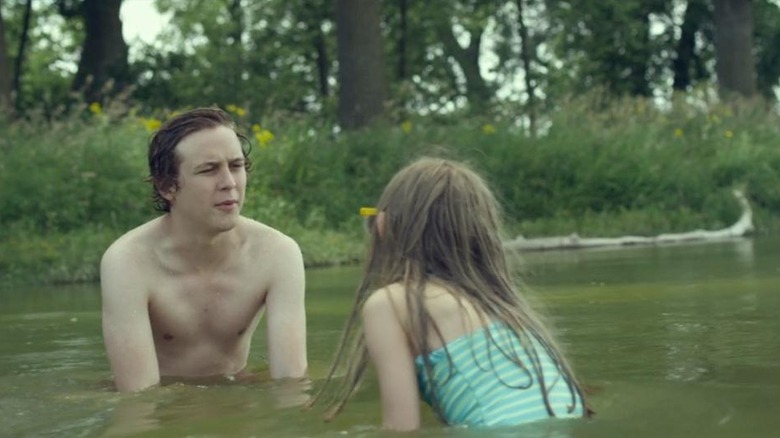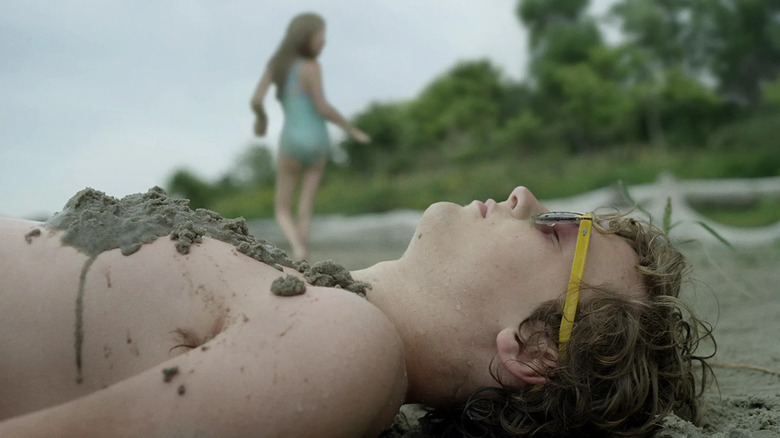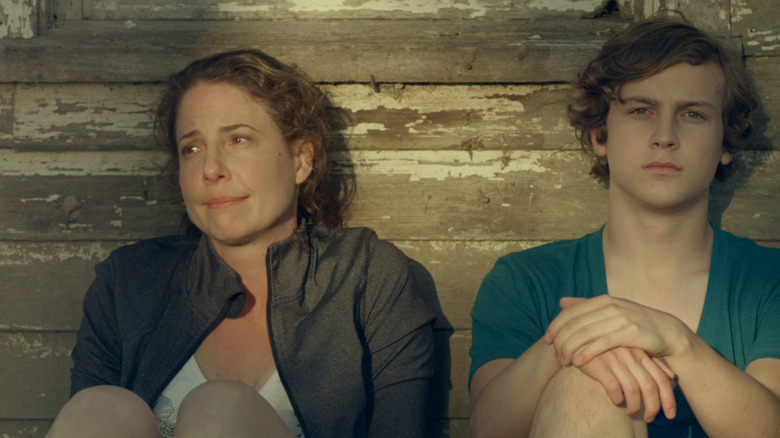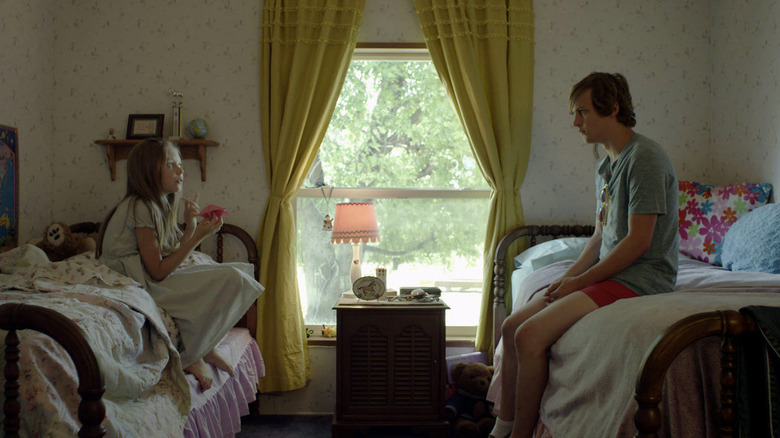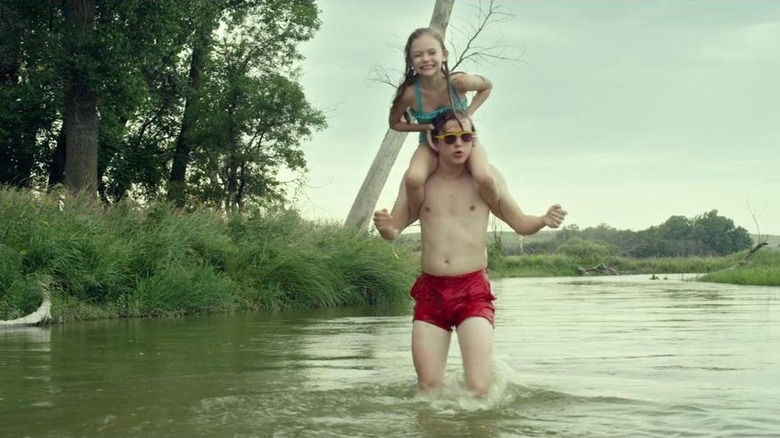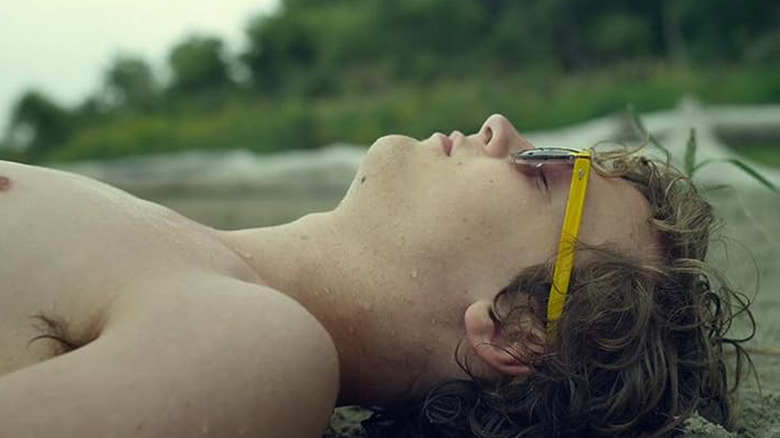The Ending Of Take Me To The River Explained
We may receive a commission on purchases made from links.
The following article contains references to child abuse and sexual assault.
Although director Matt Sobel's feature debut "Take Me to the River" garnered some good attention through its premiere at the 2015 Sundance Film Festival, most probably haven't heard of the movie. The story follows Ryder (Logan Miller), a California teen who travels with his mom Cindy (Robin Weigert) and dad Don (Richard Schiff) to a family reunion in Nebraska. There, he plans to unveil a personal secret until he finds himself stuck in a combative face-off with his tense uncle Keith (Josh Hamilton) over an incident with his daughter Molly (Ursula Parker). Now, Ryder comes to find that his family has a lot of buried secrets that force him into awkward situations and have some personal realizations.
"Take Me to the River" is an arthouse drama that harnesses some palpable tension that's incredibly relatable — especially in the current social climate. It touches on how deep family drama and trauma can run while also using Ryder's perspective to take audiences through the film's tensest moments. Plus, there are depictions and themes that audiences will easily relate to, as well as scenes that will really leave you on the edge of your seat. So, let's delve into the ending of "Take Me to the River," dissect its themes, and talk about the ways it remains relatable to modern audiences and social topics today.
What you need to remember about the plot of Take Me To The River
Before we delve into the thought-provoking and intense "Take Me to the River" finale, let's look at how we get there. As Ryder and his parents are arriving at their grandmother's Nebraska home to reunite with other family members, it's clear that he's hoping to get something off his chest. While it's never openly named what Ryder's secret is, the implication is that he's gay and wishes to come out to the whole extended family during this trip. With the conservative background of Ryder's Nebraska-dwelling family, though, his parents hope to keep his secret buried — especially from Keith. Unfortunately, Ryder comes into direct conflict with Keith after he accompanies his daughter Molly on a trip to the barn. Molly comes running back crying after, calling for her father, with blood visible at the bottom of her dress.
Although Keith suspects that Ryder has done something to his daughter, Ryder claims that nothing happened, and his parents support him. Still, tensions rise high enough for Keith to blow up at Ryder and cause a major scene at the reunion. Ryder runs from the rest of the family and is forced to sleep in a nearby barn while things cool off. By the time he returns to his grandmother's house, though, he finds that Keith has sent one of his other daughters over to apologize and invite him to dinner. Ryder accepts, but he knows that things might not be as they seem and that he could be walking into another unwanted fight.
What happens during the dinner scene with Keith?
When Ryder arrives at Keith's family home, he and the audience feel the palpable tension that's created by his presence. While everyone is nice to him — especially Keith — it's hard not to wonder if there are underlying motives at play. After all, Keith's handshake with Ryder is painfully awkward, and his apology doesn't feel completely genuine. He's still passive-aggressive towards Ryder, and by sitting across from him, he gets the opportunity to deliver an uncomfortable stare-down. Plus, when Keith calls for Molly and she walks in with an unsettling look on her face, it clearly catches Ryder's attention and makes things a little eerie.
The dinner conversation isn't any better, as Keith's wife attempts to keep the conversation light and normal but is constantly cut off by awkward questions and opinions from Keith. There are intense stares from him across the table and some suspicious remarks about Ryder's dating that create an unsettling atmosphere. Eventually, Ryder is sort of forced to head into a room with Molly to hang out, and the tension is broken when Keith suddenly enters the room to take Ryder outside. There, he pulls out a gun and says that he wants to train Ryder in how to use it to protect himself. He asks Ryder if he trusts him, and Ryder eventually tells him that he really doesn't know, solidifying the power imbalance playing out on the screen.
What happens at the end of Take Me to the River?
After Ryder's awkward ordeal with Keith, he's taken home by Molly on horseback. Instead of going home though, she decides to have them go on a detour so that they can swim in a nearby river. While Ryder is initially opposed to going in, he decides to join Molly, and the two have a seemingly pleasant time for the most part. In general, it's hard not to feel like this detour is sort of a set-up conjured by Keith, and when Molly suddenly disappears on Ryder, it instantly creates a panicked atmosphere. Ryder's search for Molly eventually leads him home, where he sees that Molly, Keith, and his parents are there almost waiting for him.
They joke about almost sending a search party out for him, but the jokes soon stop once everyone starts talking. Keith is clearly there for ulterior motives and starts to make comments that highlight something initially unseen about him. When Keith asks Molly if she and Ryder did any "chicken-fighting" down by the river, he eludes to something that happened between him and Cindy when they were younger. Given how upset both Cindy and Keith are during the conversation and how it's talked about by Keith, he's possibly highlighting some physical or even sexual abuse that occurred when he and Cindy were kids. This causes Cindy to break down, but she doesn't reveal anything more on the matter.
If you or anyone you know has been a victim of sexual assault, help is available. Visit the Rape, Abuse & Incest National Network website or contact RAINN's National Helpline at 1-800-656-HOPE (4673).
What does the end of Take Me to the River mean?
Despite some heavy accusations and subtle reveals made in the conversation between Ryder's family and Keith, there's nothing to directly draw from the film's ending. While Cindy breaks down and apologizes to Ryder, she never openly talks about what happened between her and Keith as kids. So the final car ride home shown at the end of the film is mostly filled with awkward silence until Don puts on Queen's "Under Pressure" to lead into the film's credits. This sort of open-ended conclusion is very intentional, as the film plays around with unanswered questions and unclear truths to leave things open to interpretation for viewers.
While it's never explained how Molly gets blood on her dress, there isn't much to say that Ryder did anything to her, and it possibly came from a sudden accident or was caused by her running from Ryder. There's never a direct story or answer behind Keith's subtle accusations, but what he's saying does feel clear. When he and Cindy were kids, Keith would be sexually or physically abused by Cindy by the river through their "game" called "chicken-fighting." When their mother found out, Keith was blamed instead of Cindy, and it likely caused a reputation for him to develop that wasn't true. That explains why the "chicken-fighting" game sets Keith off against Ryder and why he's so frustrated by him. However, there are plenty more thought-provoking elements of the story to dissect.
If you or someone you know may be the victim of child abuse, please contact the Childhelp National Child Abuse Hotline at 1-800-4-A-Child (1-800-422-4453) or contact their live chat services.
Another explanation
"Take Me to the River" is an exploration of the impacts of buried secrets and how they can subtly rip a family apart. Although both Cindy and Keith are aware of what's driving them apart and causing major ripples in their family dynamic, they're incapable of openly talking about it. So much time has passed that no one is comfortable with talking about it, and the scars of their past have deepened so much that there seems to be no healing them. They've both become so enveloped by how much they've hurt and been hurt by one another that being cold-hearted with each other has become normal to them. No one else in the family is even willing to step in and try to resolve this broken relationship.
Even worse is that this tension has trickled down into other secrets and issues in their family, creating a lack of communication overall. They've all grown the mindset that it's better to keep things buried than just deal with the tension of being honest and real with one another. It's a simple but impactful showing of how damaging buried secrets can be and how they can create problematic environments that affect people for years, even decades later.
The social divide
The early parts of "Take Me to the River" really show viewers how damaging first impressions can be and how strong our current social and political divide can be. With Ryder likely wanting to come out to his family, there's an instant concern that washes over his parents that makes them want him to keep it a secret. Honestly, at first glance, it's tough not to blame them. Keith's reactionary nature and tough-minded Nebraska background would make most believe that he would be frustrated by Ryder being gay. Not to mention, there are other conversations and cruel graffiti remarks that make Ryder and his family not feel welcome because of their California mindset.
All of this makes for a harsh but very real showing of how strong the political and social divide can be seen in the U.S. currently. Although everyone at the reunion is family and should be thrilled to come together under the same roof, there are these personal mindsets, social beliefs, and underlying tensions that keep them from truly being together. It's another way that these characters stay set in their ways and create tensions that bring the subtle conflicts to the surface. Not to mention, they also show audiences how their own beliefs and backgrounds cause them to make first impressions that might not be true as they get to know the characters deeper.
Closeted
Ryder's desire to come out to his family and inability to do so also acts as a way for viewers to understand what it's like to be closeted — especially by your own family. As Ryder and his parents are driving to the reunion, he's constantly asking his parents about telling everyone what he wants to say. Yet, he's kind of brushed off, and even when he tries to tell everyone at the reunion, he's cut off by Cindy because she supposedly doesn't want to create a bigger issue. Regardless of their intentions, these efforts by Ryder's parents make it seem like they don't support him either, which further solidifies him being stuck in the closet.
Ryder feels so unsupported by those around him that he's never able to bring his secret up again and is forced to be silent about it throughout the film. His depiction and arc in the film heavily display the pain and perspective of being closeted and how hard it can be to find a sense of support in a family that isn't comfortable with who you truly are. It's a harsh reality that many still suffer from, with so many in the LGBTQ+ community still seeing discrimination today.
Compromising positions
Although viewers come to learn that the main conflict in "Take Me to the River" is actually between Cindy and Keith rather than Ryder and Keith, it's hard not to realize how Cindy and Keith's conflict affects their children and younger generations of this family. Because of how little Cindy and Keith's past is talked about, the only thing that Ryder and his younger cousins can do is assume things about them and their reactions. It's a big reason why Ryder is so confused about why Keith is so harsh towards him, and it's what makes him assume that it's Keith's conservative background that makes him hateful towards him. He probably even thinks that Keith is abusive towards the people around him, and it's what makes his interactions with Molly and other members of his family so awkward.
Every interaction between Ryder and one of his family members generally carries this looming tension that can't be ignored and plays a significant role in why things can't be resolved. Cindy and Keith's tensions have so obviously trickled down to the younger generation of their family, and it's why they all struggle to be close. It's a clear showing of generational trauma and a cautionary reminder of the damage that can be caused by being closed-off, since it can not only affect your own relationships, but also the people who look up to you.
Will there be a sequel to Take Me to the River?
Now for the question that seems to come after every film nowadays: Could the movie get a sequel? Currently, there's been no announcement from Sobel or Film Movement that a sequel to "Take Me to the River" is in development, and no one should probably expect there to be another film. "Take Me to the River" isn't the type of movie that a franchise can be built off of, nor is it meant to be anything more than a one-and-done arthouse film. Its ending perfectly leaves things open for viewers to interpret themselves and shows no interest in further exploration of its story or characters.
Now, there is room to further explore Ryder's personal life or look at another interaction between his and Keith's family in the future to see how the conflict develops. However, a sequel establishing answers that the first film wants to keep ambiguous goes against the clear intentions of the ending. So, there's kind of no point in continuing the story of "Take Me to the River" and its characters. Overall, the film will simply be left as a one-off film festival favorite that kicked off the career of Sobel and presented a story with some meaningful modern ties.
What is the legacy of Take Me to the River?
Although "Take Me to the River" is a pretty obscure indie movie that most probably haven't heard of before, it does have a legacy that's worth noting. After all, no film that appears at Sundance should easily be forgotten, and the themes and depictions within the story make it a very relevant tale of trauma. As mentioned before, there are a lot of strong takeaways that viewers can have from the film that apply to our current social perceptions and personal struggles still felt within the LGBTQ+ community. Ryder's inability to find support within his own family evokes a lot of subtle pain that reflects the unfortunate reality of homophobia existing even within our own families — causing some to feel unwelcome or uncared for within their own inner circles.
The persisting trauma and tension between Cindy and Keith is an important showing of why it's important to establish open lines of communication. It further delves into the lasting damage of keeping things buried and how all the tension and hate boiling up can cause issues within other relationships and dynamics. There's actually a lot for viewers to chew on and think about with "Take Me to the River," and that's why its more interpretive ending is so effective, giving it some relevant modern roots that let the film's legacy carry on.
